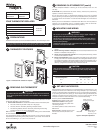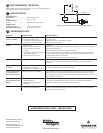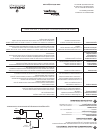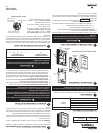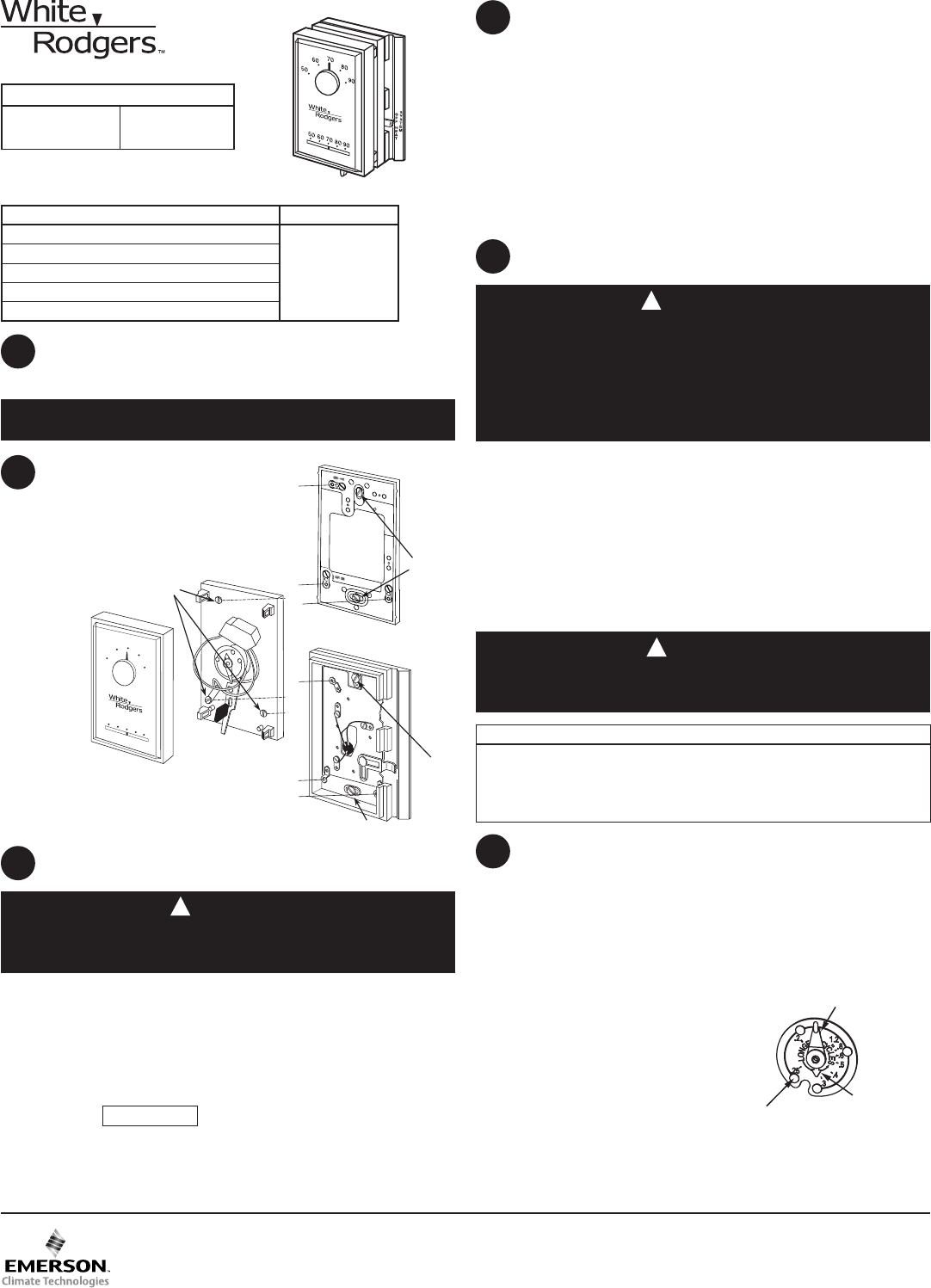
Do not use on circuits exceeding specifi ed voltage. Higher voltage will
damage control and could cause shock or fi re hazard.
Do not short out terminals on gas valve or primary control to test. Short or
incorrect wiring will damage thermostat and could cause personal injury
and/or property damage.
Thermostat installation and all components of the system shall conform
to Class II circuits per the NEC code.
YOUR THERMOSTAT REPLACES
System Models
Standard Heat Only Systems
1E30N-910
1E50N-301
Electric Furnace
Heat Pump (No Aux or Emergency Heat)
Gas or Oil Heat
Millivolt Heat Only Systems
1
PREPARATIONS
Assemble tools required: power drill, fl at blade screwdriver, wire cutter/stripper, level.
Failure to follow and read all instructions carefully before installing or op-
erating this control could cause personal injury and/or property damage.
2
THERMOSTAT FEATURES
Captive
screws
Mounting
Screw
Mounting
Screw
COVER
THERMOSTAT
BASE
WALLPLATE
SWITCHING
SUBBASE
S
Y
S
T
E
M
O
F
F
H
E
A
T
G
W
RH
Mounting
Screw
50
60
70
80
90
50
60
70
80
90
4
Figure 1. Thermostat with subbase or wallplate
To prevent electrical shock and/or equipment damage, disconnect electrical
power to the system at the main fuse or circuit breaker until installation is
complete.
CAUTION
!
Before removing wires from old thermostat’s switching subbase, label each wire with
the terminal designation it was removed from.
1. Remove Old Thermostat: A standard thermostat consists of three basic parts:
a. The cover, which may be either a snap-on or hinge type.
b. The base, which is removed by loosening all captive screws.
c. The switching subbase, which is removed by unscrewing the mounting
screws that hold it on the wall or adaptor plate.
Make a note here of the anticipator setting on the old thermostat
for future reference and use in step 5.
The heat anticipator pointer, if adjustable, will be set at one of a series of numbers
representing the current rating of the primary control in your furnace. The number will
be one of the following: .2, .4, .8, etc. or 0.2, 0.4, 0.8, etc.
3
3
REMOVING OLD THERMOSTAT (cont’d)
If no heat anticipator/indication is showing, do not be concerned; move on to the
next step.
ATTENTION! This product does not contain mercury. However, this product may
replace a unit which contains mercury.
Do not open mercury cells. If a cell becomes damaged, do not touch any spilled
mercury. Wearing non-absorbent gloves, take up the spilled mercury and place into
a container which can be sealed. If a cell becomes damaged, the unit should be
discarded.
Mercury must not be discarded in household trash. When the unit this product is
replacing is to be discarded, place in a suitable container. Refer to www.white-
rodgers.com for location to send product containing mercury.
4
MOUNTING AND WIRING
WARNING
!
A. Remove base from subbase or wallplate: Loosen the screws on the base and
remove.
B. Mount switching subbase or wallplate: Use the screws provided to mount the
subbase or wallplate to wall (see Fig. 1).
C. Attach wires to appropriate terminals: Two wire systems (Heat Only). Attach
one wire to RH and one to wire W.
D. Mount Thermostat Base: Gently push excess wire back into the wall opening
and plug hole with a fi re-resistant material, such as fi berglass insulation to pre-
vent drafts from affecting thermostat operation. Mount the thermostat base to
the subbase or wallplate using the three captive screws on the thermostat base.
(See Fig. 1) Tighten the screws securely. Proceed to Step #5.
TERMINAL CROSS REFERENCE CHART
New Thermostat Other Manufacturers’
Terminal Designation Terminal Designation
R H 4 R H M R 5 R
W W W H 4 W
5
Set anticipator to match the setting of your old thermostat you noted in Step 3, or, the
anticipator should be set to match the current rating stamped on your main heating
control. The heat anticipator is adjustable from 0.15 to 1.2 amps. Adjust the anticipa-
tor by rotating the contact arm (see fi g. 2). The anticipator setting is indicated by the
numbers on the base that the pointer points to. If you are unsure where to set the
anticipator contact the heater manufacturer for a recommended setting.
Move the pointer counterclockwise to
lengthen heating system cycles; move
clockwise to shorten heating cycles.
Adjustments should not be greater than
1/2 marking at a time.
For millivolt operation, rotate contact arm to
Millivolt Link.
Snap on Cover: Carefully align the cover
with the base and snap the cover onto
the base.
Rotate contact arm
to adjust heat anticipator
Arrow points to the
current rating of
the primary control
Millivolt Link
REMOVING OLD THERMOSTAT
Take care when securing and routing wires so they do not short to adjacent
terminals or rear of thermostat. Personal injury and/or property damage may
occur.
CAUTION
!
SET HEAT ANTICIPATOR
Figure 2. Anticipator adjustment
Installation Instructions for:
Vertical
Snap Action
1E30N-910
1E50N-301
www.white-rodgers.com
PART NO. 37-6844B
Replaces 37-6844A
0920



